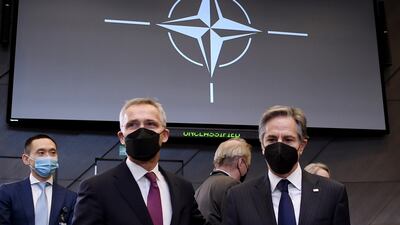Live updates: follow the latest news on Russia-Ukraine
Nato said on Friday it has more than 100 fighter jets on high alert and 200 ships positioned from north to south to deter Russia from escalating the war in Eastern Europe beyond Ukraine.
The alliance’s Secretary General Jens Stoltenberg said it would “do whatever it takes” to defend “every inch of Nato territory” from any Russian attack.
But Nato’s top diplomats confirmed on Friday what Mr Stoltenberg called the “painful decision” to keep their troops and planes out of non-member Ukraine despite the scenes of destruction unfolding there.
Although Ukraine is pleading for a no-fly zone in its airspace, senior western leaders say this would involve shooting down Russian jets and thereby risk a further escalation of the war.
“We understand the desperation,” Mr Stoltenberg said, “but we also believe that if we did that, we end up with something that could end in a full-fledged war in Europe.”
As the war entered its second week, there was a brief resumption of east-west talks as German Chancellor Olaf Scholz told Russian President Vladimir Putin in an hour-long call to call of hostilities and allow access for humanitarian workers. Mr Putin said a third round of ceasefire talks with Ukraine would take place at the weekend.
Nato countries are supporting Ukraine’s resistance with weapons and trying to pressure Russia into backing down by hitting its economy and top leadership with sanctions.
But the attention of foreign ministers turned more broadly on Friday to preventing the war from spreading elsewhere in Europe and exacerbating an already acute humanitarian crisis. Britain on Friday formally launched a scheme for Ukrainians in the UK to bring their extended family to live with them.
Diplomats have spoken of a changed security environment in which countries must prepare themselves for hostility with Russia, with Germany notably turning a historic page by announcing a military ramp-up and exporting weapons to Ukraine.
Threats inside and outside Nato
Within the 30-member alliance, the US and European countries have sent thousands more troops to Nato’s eastern flank to defend countries neighbouring Russia such as Lithuania and Estonia.
Mr Stoltenberg said 130 jets were on high alert and 200 ships stationed “from the high north to the Mediterranean” to deter any Russian attack.
Units from a special Nato response force have been deployed for the first time, with 500 French troops flying to Romania to shore up part of the alliance’s eastern border.
Western allies’ response has been cheered by Nato as a show of transatlantic unity at a time when the alliance is facing questions over its future, with France leading calls for the EU to gain more autonomy in defence matters.
But security fears go beyond Nato’s borders, with the outbreak of war reviving a decades-old debate in Finland and Sweden over whether they should join the alliance.
Both countries took part in Friday’s meeting on what Britain has described as one of the biggest days of diplomacy on record, with the Nato talks followed by an EU summit at which the UK, US, Canada and Ukraine were invited as guests.
The two Nordic countries will take part in all Nato consultations over Ukraine crisis and more information will be shared between them and the alliance, the Secretary General said.
Nato is also looking to deter any Russian aggression against non-member Georgia, which fought a war with Russia in 2008, and Bosnia and Herzegovina.
Mr Stoltenberg said such countries could be at risk because the Kremlin had demonstrated a desire to “recreate a sphere of influence” in Eastern Europe and “deny other countries the right to choose their own path”.
Although there were no concrete decisions at Friday’s meeting, foreign ministers agreed that Georgia and Bosnia should receive more training and support in strengthening their defence and security institutions.
Similar support has been provided to Ukraine in recent years, which western leaders credit with helping to slow down the Russian invasion which stretched into an eighth day on Friday.
The Brussels meetings came in the shadow of Russian shelling near an operating nuclear power plant, adding to fears of a radioactive release after invading troops earlier took control of the Chernobyl disaster site.
Mr Stoltenberg said the incident was an example of Russia’s recklessness in waging war against Ukraine.
The days to come “are likely to be worse with more death more suffering and more destruction,” he said, as Russia brings in heavier weaponry and continues its attacks across the country.
“We call on President Putin to stop this war immediately,” said Mr Stoltenberg, and “withdraw his forces from Ukraine without conditions and engage in genuine diplomacy.”
Although western leaders believe their sanctions on Russia are starting to bite, Mr Putin has shown no signs of backing down in what he calls a special operation to demilitarise and "de-Nazify" Ukraine.
Britain says it wants to see more western sanctions, which officials are preparing in the background but were not on the table for approval at Friday’s meeting.
At the EU meeting, US Secretary of State Antony Blinken said failing to punish Russia would put the long-cherished principles of self-determination and territorial integrity in doubt beyond Ukraine.
"If we allow those principles to be challenged, as Putin is doing now with impunity," he said, "that will open a Pandora’s box of trouble."




























































